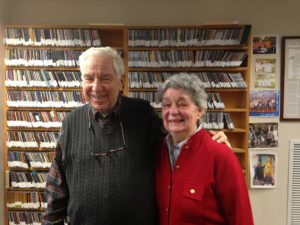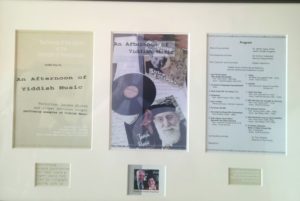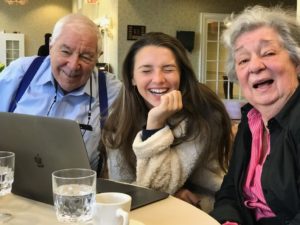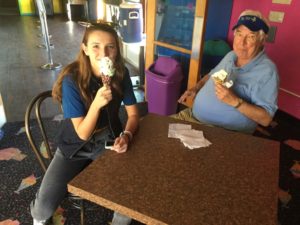
Penn Libraries, the University of Pennsylvania-based repository for the Robert and Molly Freedman Jewish Sound Archive, calls it “among the most important resources in the world for the study of Jewish culture, folklore, history, linguistics and literature through the medium of sound.”
That description comes from Penn Libraries’ website, which explains that the archive includes more than 40,000 songs, 5,923 albums and 1,510 pieces of sheet music. Donated to Penn in 1998 after it got too big for the Philadelphia-based Freedmans to house, the collection holds Yiddish songs, klezmer music and vaudeville acts, among others, from the United States, the former Soviet Union and Israel, among others.
“Faculty at Penn regularly bring their students to learn about the Freedman archive,” the website description reads.
The university labeled the Freedmans’ six-decade effort to build the collection “a labor of love.”
And that label could not have been more on point.
Robert Freedman, now 92 but still a savvy husband, gave most of the credit to his wife, Molly Freedman. He said she motivated him to start buying the old recordings on work trips to different towns.
The Yiddish music reminded her of her childhood, and she wanted to preserve it.
At some point during each trip, Robert Freedman, who worked as a lawyer, would stop in an old record store in the downtown area. Eventually, the Freedmans started making these visits together during their vacations.
“No matter where I traveled, instead of taking a lunch hour, I would walk downtown, find a record store,” Freedman said.
“I had a lot of business in New York. Michigan. Almost any town you can name,” he continued.
“On vacations when we traveled, South America. Argentina was a real treasure trove. They have a big Jewish community. France. Including Sephardic records. Amsterdam, I was amazed, had the largest Jewish record store in Europe,” he continued. “Would you believe that I found a couple of Yiddish records in the Vatican? I bought two records there.”

But Robert Freedman further explained that to truly understand why this became the couple’s passion, you have to understand their background.
Robert Freedman and Molly Freedman did not grow up together; he came from Upper Darby, she from West Philadelphia. But they nonetheless came of age in a similar Jewish culture.
Their families were secular, cultural Jews who sent their kids to afternoon schools that taught students how to read and write in Yiddish, as well as summer camps where they played and sang Yiddish music. Robert Freedman also has memories of singalongs in his parents’ “tiny Upper Darby living room,” as he described it, in which relatives and friends would “sing all night.”
The Freedmans came from an Old World culture, and they were set up in an Old World kind of way, too.
His mother and her aunt ran a beauty parlor together, and with Robert Freedman a young lawyer and Molly a 22-year-old beauty, they saw them as a natural fit. So her aunt, Sophie Fireman, invited Robert Freedman and his parents to a dinner party at her house.
When they arrived, there was no party. Just a conversation between Robert Freedman and Molly’s uncle at the basement bar.
Later, Molly walked in with her parents and her father addressed Robert Freedman’s mother by her maiden name. They had grown up in neighboring shtetls in Ukraine.
Six weeks later, the couple was engaged. Though he may not have had a choice in the matter, Robert Freedman agreed that his wife-to-be was “gorgeous,” he said.
But his father may have liked her even more.
“‘She understands Yiddish, she reads Yiddish, she writes Yiddish, and with it all, she’s good-looking,’” Robert Freedman recalled, quoting his old man.
After marrying and having two sons, Albert and David, Molly Freedman asked her husband a question one day.
“I miss the music,” she said. “Why don’t you look for records, and bring them home?”
That’s when the collecting started.
David Freedman, now 59, remembers his father playing the music in their living room. He also recalls his father getting up on Sunday mornings to listen to the “The Barry Reisman Show.”
“It was the only place in Philadelphia that was on the radio with Yiddish music back in the ’60s, ’70s and ’80s,” David Freedman said.
What started as a fun nostalgic activity grew into something more over time.
Robert Freedman began cataloging the records and songs into a computer database. When the Freedmans lived in an apartment complex in Rittenhouse Square, word got out about the collection, and they started receiving donations.
“The collection got so large that we had to buy another apartment, a studio apartment, to store the recordings,” Robert Freedman said.

Researchers started visiting and asking to stay over at the studio, so the Freedmans put a bed in there. One Klezmer enthusiast stayed for more than a week.
“We finally decided that it belonged in an institution,” Robert Freedman said.
Robert Freedman wanted to donate it to an organization in New York City. But again, it was his wife who made the final call: It had to stay in Philadelphia.
“Molly said, ‘We’ll never see it again,’” Robert Freedman recalled. “‘It belongs here.’”
When they donated the collection to Penn, the Freedmans got an appraisal valuing it at $240,000, according to Robert Freedman. But it’s worth much more than just dollars.
The Freedmans celebrate their 63rd wedding anniversary this month. Molly Freedman has dementia, but she can still remember the Yiddish songs and sing along.
Robert Freedman will start a song, and Molly Freedman will “go right into it,” as her husband described it, and then the two will sing together.

“The significance to the Jewish community,” said their granddaughter, Maya Pratt-Freedman, a Penn student who recently made a short film about the archive for a final assignment. “It’s a gold mine of the past.”
[email protected]; 215-832-0740







What a treasure trove! Thanks for the memories – and for constant reminders of where we may have
come from – as well as where we are today. One more reason for our ‘national’ pride, along with many
international memories. THANK YOU!